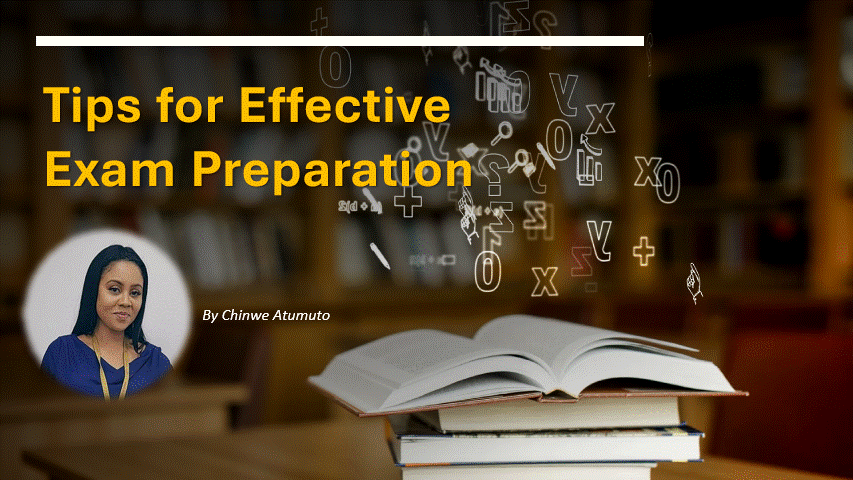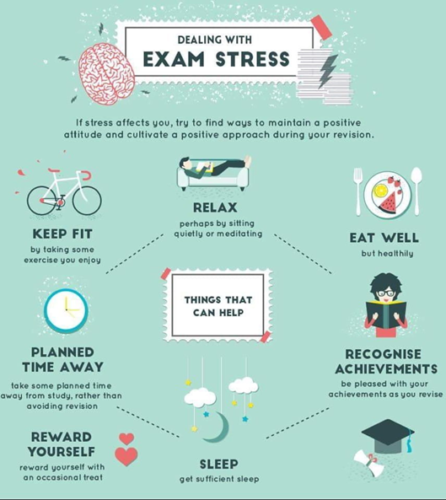Tips for Effective Exam Preparation
Article Date | 12 May, 2023 By Chinwe Atumuto, Lecturer in Health, LSST Elephant and Castle Campus
By Chinwe Atumuto, Lecturer in Health, LSST Elephant and Castle Campus
XXX
Preparing for an exam may be an overwhelming task, especially if it involves a high-stakes test that will determine your academic or career progression. However, with the correct mentality and strategies, you can tackle exam preparation with confidence and accomplish your desired outcomes. Here are some preparation tips:
Create a Study Plan
Creating a study plan is one of the most efficient approaches to preparing for a test. This plan should contain all the subjects and concepts you will need to cover, as well as the amount of time you will devote to each. Concentrating on essential information and writing them down as exam answers will help you recall what you learnt in class. Set reasonable goals and prioritise the most vital information.
Set Goals
Set attainable objectives for each study session, such as completing a specific chapter or topic. This will assist you in staying motivated and making progress towards your overall goal. Make use of the SMART goal-setting framework (Doran, 1981): The SMART framework is a well-known way of establishing effective goals. SMART is an acronym meaning Specific, Measurable, Achievable, Relevant, and Time-bound. Make sure your exam preparation goals match all of these criteria. Examples of implementing SMART goals can be found below:
> Specific: Completing the first five chapters of the core textbook before the end of the week.
> Measurable: Aiming for a minimum of 60% on the next practice quiz/exam.
> Achievable: Setting a goal to learn an entire semester’s worth of material in one night is unrealistic. It’s better to study for an hour every day for the next two weeks to achieve the goal.
> Relevant: Looking through additional reading materials relevant to the exam topics in addition to reading core books and lecture materials.
> Time-bound: Making a study schedule that includes daily study sessions of at least 1-2 hours and covers all course materials. Giving yourself a deadline for when to complete the study schedule by to start your revision routine.
Pomodoro Technique
Francesco Cirillio invented the Pomodoro Technique in the 1980s (Swan et al., 2020), this is a time management tool that will assist you in being focused and productive when studying. The method involves splitting your study sessions into 25-minute increments interspersed by brief breaks. The goal is to assist people to focus on things better by minimising the amount of time it takes to sustain that attention and assuring restorative pauses from the effort. The strategy also assists individuals in overcoming procrastination and multitasking habits, both of which are known to reduce productivity.
Use Active Learning Techniques
There are various methods of acquiring information such as reading textbooks or lecture materials. However, it is worth noting that active learning strategies tend to be more effective than passive ones. Try engaging with the learning materials: take notes, make flashcards, or explain topics to someone else.
Active Recall
This is one of the most effective strategies to acquire and retain knowledge. This entails putting your knowledge to the test by attempting to recall it from memory rather than merely rereading it. Active recall has been proven in studies to boost learning and retention by up to 50% (Karpicke and Roediger, 2008). Practice writing exercises, and summarising essential topics in your own words are examples of good approaches to practice active recall. Implementing such practices will help you remember the knowledge and draw connections between different topics.
Find a Study Group or Partner
Forming a study group or choosing a study partner might help you keep motivated and accountable while you are studying. In their study of collaborative learning, Lou et al. (2020) discovered that studying in groups can improve learning outcomes and boost knowledge retention. It can also facilitate cooperation and discussion, which can aid in your knowledge of the materials.
Use Technology to Your Advantage
Technology can be an extremely useful tool for exam preparation. Make use of applications, software, and online tools to help you organise your notes, build mind maps, and quiz yourself on the content. However, try to avoid distractions like social media and unnecessary websites.
Here are a few popular test revision aids, as well as links to respective websites:
1. Quizlet – www.quizlet.com
2. Forest – www.forestapp.cc
3. Khan Academy – www.khanacademy.org
Take Care of Your Physical and Mental Health

Exam preparation requires you to take care of both your mental and physical well-being. Eat healthy foods, exercise regularly, and get adequate sleep. You should also take pauses as needed and avoid cramming, which can lead to burnout and decreased performance.
Physical exercise has been shown to be favourably connected with academic performance since it can reduce stress and improve cognitive functioning (Stine-Morrow et al., 2019). There is also an emphasis on the significance of sleep quality and stress management for academic achievement since these factors can have an influence on memory consolidation and attentiveness. Overall, taking care of your physical and mental health while studying can improve your academic success.
Stay Positive and Confident
Maintaining an optimistic and confident attitude is critical for exam performance. Do not allow nervousness or self-doubt to come in the way of believing in yourself and your skills. Exams are only one facet of your academic or professional path; there are always opportunities to learn and grow.
In conclusion, effective test preparation involves an array of planning, active learning, practice, self-care, cooperation, technology, and mentality. By using these recommendations, you can face tests with confidence and achieve your goals.
Good luck with your exams!XXXXXXXXXXXXXXXXXXXXXXXXXXXXXXXXXXXXXXXXXXXXXXXXXXXXXXXXXXXXXXXXXXXXXXXXXXXXXXXXXXXXXXXXXXXXXX
References
Doran, G. T. (1981). There’s a S.M.A.R.T. way to write management’s goals and objectives. Management Review, 70(11), 35-36.
Karpicke, J. D., & Roediger III, H. L. (2008). The critical importance of retrieval for learning. Science, 319(5865), 966-968. doi: 10.1126/science.1152408.
Lou, Y., Abrami, P. C., Spence, J. C., Poulsen, C., Chambers, B., & d’Apollonia, S. (2020). The Effectiveness of Collaborative Learning: A Meta-Analysis. Review of Educational Research, 90(5), 607-651. doi: 10.3102/0034654320949923.
Stine-Morrow, E. A. L., Parisi, J. M., Morrow, D. G., & Greene, J. D. (2019). The Impact of Physical and Mental Health on Exam Performance: A Prospective Study. Educational Psychology, 39(8), 1053-1066. doi: 10.1080/01443410.2019.1588083.
Swan, K., Danner, A., Hawkins, M., Grant, S.G. and Lee, J., (2020). Zooming Inquiry: online teaching with the pomodoro technique. Social Education, 84(4), pp.229-235.




